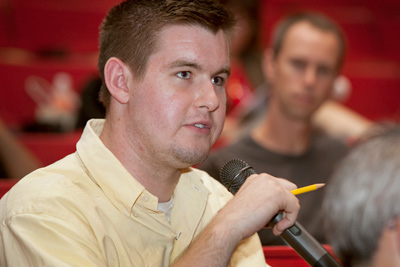Skorton asks for students' input on strategic plan
By Susan Kelley

Students can help shape Cornell's future by offering their advice on its strategic plan today. "Your engagement is critical," said President David Skorton at a student forum Sept. 17 in Uris Hall Auditorium. "That's not fluff. Our interaction, right now, during this pivotal time at the university, is critical."
Skorton began the forum with an overview of why the university would have had a projected $215 million annual deficit by 2015 had it not taken action. The projected annual deficit now stands at $135 million.
He urged the dozen students who attended to tell their friends to come to the second student forum Oct. 2. "If one single student will come to a forum, I'm happy to stay as long as people want," he said. He also asked them to e-mail him and Provost Kent Fuchs directly, and to talk to task force members who are creating the strategic plan.
"Now is the time for us to link our arms and figure out the way to make this university go forward and be even better than it is now," he said.
It was the third of five forums Skorton and Fuchs are holding this semester for staff, faculty and students to discuss the university's strategic planning process, called Reimagining Cornell.
Questions from students were pointed.
Is Reimagining Cornell a euphemism for temporary program cuts? asked Murtza Manzur '11.
No, Skorton said. About 40 percent of the projected annual deficit of $135 million is due to reduced endowment payout; fiscal problems would return even if the endowment payout increased.
More importantly, he said, the university can always improve how it functions and educates. "We will have failed miserably if we just cut the budget … and then let everything go in a direction that we haven't thought of together," Skorton said.

Fuchs added that all sorts of ideas are being discussed. One college is considering cutting 40 percent of its departments. At the same time, the creation of new schools is being considered. "Everything is on the table," he said.
What decisions have been made so far about combining schools? asked Brendan Doyle '12, a reporter for the Cornell Daily Sun. None so far, Fuchs said; academic task forces will make initial recommendations in October.
Fuchs also announced a new timeline for the strategic plan. In October, colleges and task forces will complete their assessments; Fuchs will appoint strategic planning advisory committees and review proposals; and an outside consultant will conclude its work on administrative cost savings. In December, Skorton and Fuchs will announce initial university-level decisions; strategic planning advisory committees will finalize major goals and objectives; and Skorton and Fuch will OK a draft of the FY11 budget.
Skorton added that five new guidelines have been drafted -- and will continue to evolve -- to help those involved make decisions. They are:
- Decisions about reorganizing programs should be based on relevance to the university's mission (teaching, research and outreach) as well as efficiency and cost savings.
- Reductions in spending should be greatest in administrative areas.
- All units will help reduce the deficit.
- The president will make final decisions after transparent and broad consultation.
- Decisions should favor colleges and units, unless they conflict with the interests of the university as a whole.
How would the planning process affect the university's current bid for reaccreditation? asked Ph.D. candidate Mike Walsh, who represents graduate students on the Cornell Board of Trustees. The two processes are running in parallel and inform each other to some extent, Fuchs said, especially because the reaccreditation requires the university to focus on educational outcomes.
Other questions addressed how the strategic plan will affect Cornell's commitment to cut its carbon emissions to zero by 2050, how the university will communicate its progress on the plan, and the formal avenues through which students can participate in the planning process.
The student forum scheduled for Oct. 2 has been postponed. A staff forum will be held Oct. 1, noon-1 p.m., in G10 Biotech. All the forums are streamed live and archived at CornellCast, http://www.cornell.edu/video.
Media Contact
Get Cornell news delivered right to your inbox.
Subscribe